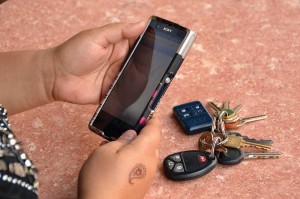“I was nervous and excited trying to figure out what’s next, what college I was going to attend — things most 18-year-olds are supposed to be doing and be excited about,” Samya said.
On graduation day, as she sat with her family waiting for her name to be called, Samya watched others — mostly virtual strangers — who were graduating with honors and scholarships, and she began to fall into a depression.
“I didn’t have any real friends graduating with me,” she said. “When it got to me, they called my name and nobody clapped, not even my family. I didn’t get any awards or scholarships because I wasn’t allowed to put in the extra time for any of that. … I knew I could be one of those graduating with honors, but I was held back.”

Samya was the first kid in her family to graduate from high school, so she’d been hoping for some sort of celebration. But as they drove away, her father seemed upset. Graduation dinner turned out to be fast food, eaten in the car.
Her father asked her why she didn’t get any awards or scholarships.
“I couldn’t believe he was asking me, and I lost it,” she said. “I screamed that it was his fault because he never let me put in the extra work. I could have taken AP classes for college credit or participated on the math or science team to add to my resumé … but my life was being set up to please my future husband, so none of that was allowed.”
A few hours after they got home, Samya started taking her father’s pills.
“My dad had a ton of prescription drugs, so I proceeded to take an entire bottle of Tramadol [a pain reliever],” she said. “I figured I’m either going to die from this, and I wouldn’t feel anything or be hurt anymore, or I would be in the hospital and get the love from my parents that I never got. I can’t remember hugging or kissing my mom ever, and that’s sad.”
She hadn’t completely, given up hope, however.
“I don’t know why, but I reached out to Craig, and he convinced me to go to the hospital,” Samya said. She told her parents what she’d done, and her father took her to the emergency room.
At the hospital a doctor recommended counseling. Her father said she needed only prayer and the Koran, and he took her home.
A few weeks later, her uncle, visiting from the Middle East, revealed something that made it clear to Samya that she couldn’t stay at home much longer.
“It was just him and me outside, and he proceeds to tell me about an arranged marriage my father was secretly planning for me with someone from my homeland,” she said. “He said the only reason he was telling me was because he thought it was wrong for my father to be keeping it from me, not that the arrangement was wrong.”
Samya told him she didn’t want that. He threatened to kill her if she refused it, she said.
Terrified, Samya started figuring out what she needed to do to get away.
********
For the rest of the summer, Samya kept her fears to herself and her Twitter friends and went about her days thinking and searching for answers.
Her parents had agreed to allow her to enroll in a local community college. That could give her a way out, Samya thought. As the fall semester approached, she also felt that she’d found freedom in her mind as well.
One evening before dark, alone in her bathroom, she felt thirsty and hungry. It was Ramadan, the Muslim month of fasting from dawn until sunset. She took a long look in the mirror.
“I remember sitting there, looking into that mirror, and it suddenly hit me — there is no God,” she said. “I looked down and took a drink of water and felt free for the first time in my life.”
At that moment, “It came down to not enough evidence, and I was pushed toward the pro-science views I already held,” she said. “I love science. It promotes just being a reasonable person, for one thing — critical thinking and skepticism. If it wasn’t for my skepticism and love of science, I wouldn’t have made the decisions in my life that I have made. I’d still be religious and oppressed now.”
Now her plans really began to gel. Her family gave her money to pay for the fall semester.
“Instead of actually enrolling, I just saved the money they gave me for classes and books and started trying to figure out how to get out,” Samya recalled. “Craig suggested I speak to a counselor” at the college.
She did, and the counselor directed her to a social worker, who helped her plan an escape. They picked a date.
Each school day, Samya’s father dropped her off on campus. Each day, she pretended to go to class. Instead she was bringing her belongings, little by little, and storing them in a locker.
“I began desensitizing myself from my family, emotionally detaching myself from them,” she said. “It was hard. I would have moments where I’d see my sisters playing video games and laughing and see my mom on the phone. I would look around and see this family that I was going to leave forever and knowing they weren’t going to be happy.”
Those weeks were filled with doubt.
“There were times when I would tell myself it would be much easier to just accept the marriage to make them happy and see where that life took me, but I truly did not want that,” she said. “It’s not where my heart was.
“I was scared of the unknown, but I knew I had to do it,” she said. “I knew I was either going to end up killing myself or be killed by my family or just living unhappy. I didn’t want any of that.
“I wanted to try life.”
Finally, after a month of saving money and pretending to go to class, Samya, now 18, packed the rest of what she needed, hugged each family member, and got in the car with her father for the last time.
“I left my phone and a letter for them saying ‘I have to live on my own, I want to become my own person,’ ” she said. “I didn’t want them to track me down with that phone. I hid them kind of under the blanket so they wouldn’t find them right away, while I was still at the school.” But she kept the iPod.
The social worker was there to get her to a shelter, and Samya took the final step in leaving behind Islam and her family.
“That was the first day I took off my scarf. I felt naked,” she said. “I still wear a lot of layers and clothing around my neck. It comforts me.”
That night, a worker from the shelter took her to the bus station and bought her a one-way ticket to Texas, where a couple from Metroplex Atheists had offered to let her stay rent-free in their home.
“I was anxious and scared to get on that bus,” she said. “I kept telling myself, ‘I need to do this. I need to be happy.’ ”
********












Religion poisons everything.
What a lovely religion, where you have to be afraid that your family will murder you if you leave it.
It is completely delusional to say that arranged marriage isn’t “forced” because both parties have to agree to it. I wonder, how many young women are pressured by their families to say yes? How many are offered lavish and expensive weddings to “agree” to the “match”?
Furthermore, it is also nuts to suggest that just because someone shares your religion, they are a good match for you. It takes more than religion to find a real, human connection with someone else. And it’s up to the individual to find the best person for them, not their parents or family members.
Ron Reagan thanks for your comments on TV. You a good guy I am impressed by your courage.
“Both man and woman have to agree for the marriage to be valid. There has to be a vocal acknowledgement with at least two witnesses who hear the verbal agreement.”
Of course after you say “no” if you are beat to a pulp you tend to make that a “yes” at the closest possible chance.
It may be true that Islam doesn’t have true forced marriages, but Islamic culture does. Frankly, I don’t give a crap either way.
This is a fantastic article. It has the power to free people from the oppression which happens when people with questionable mental health issues use religion as a ‘club’ to beat their fellow worshippers into submission.
We see these effects within the context of every religion because we see the issues of unhealthy mental states in all peoples from all backgrounds.
I would love to see many follow-up stories based on this theme. I think it would be gloriously freeing for countless thousands of humans who struggle with the issues of God and belief and LOVE because of the confusing, oppressive behaviors and words of those close to them who are afflicted by many, deep unresolved emotional issues and fears.
I am a Christian, I have been a Hospice Chaplain, I can honestly say that I do not judge a belief system when I enter someone’s home. I strive to respect and to honor all people, having Muslim, Jewish, Hindu, Buddhist friends who’ve taught me that the many ways we are similar vastly outweighs the number of ways we are different. If ‘God is LOVE’ and we are all created by a loving Creator…. then I think it is time we focus on what our actions and words mean to ourselves and to others, rather than on what we say we beleive. Thank you Kenney Kost for opening the eyes and hearts of people who are unafraid to look deeply into their own hearts first, clearing out the; beams, logs,obstacles, which may keep us from hearing the cry of another human heart. You have blessed me deeply in the way you’ve chosen to honor Samya’s freedom to choose n honorable life for herself.. Thank you! more, more, more…..